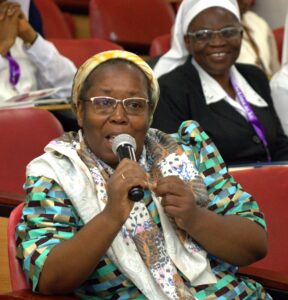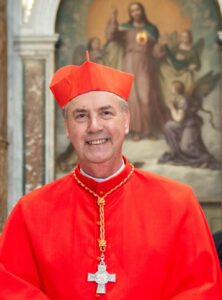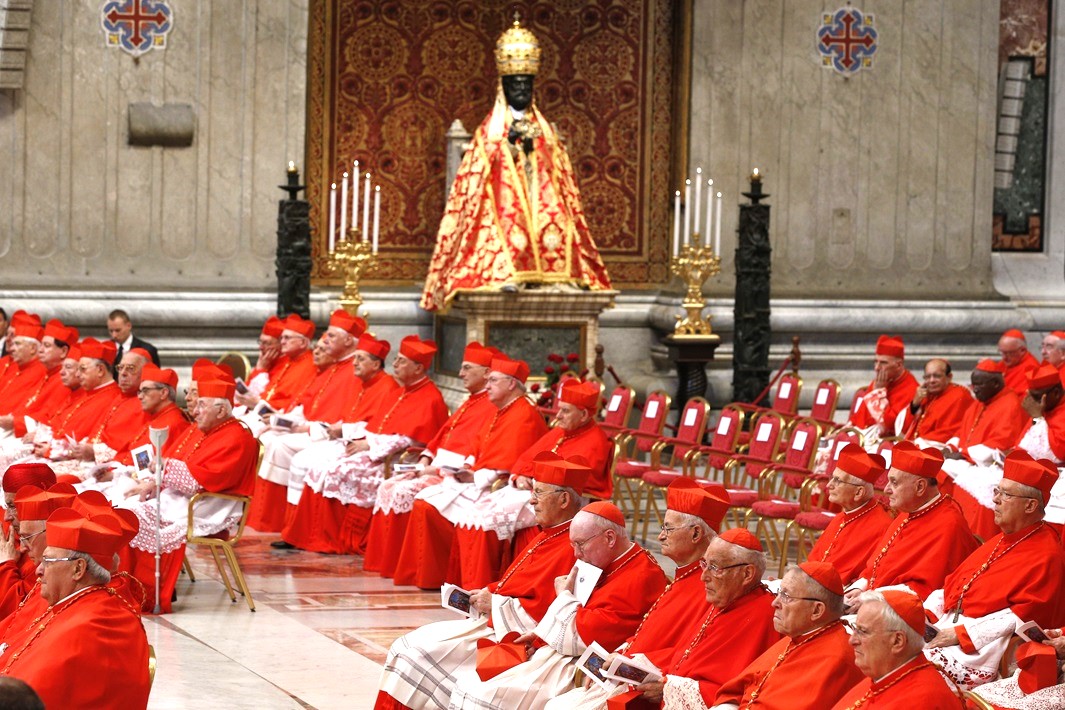By Paschal Norbert
NAIROBI, MARCH 19, 2024 (CISA) – Women constitute the majority of the population of the Catholic faithful at roughly 70% yet a paltry 3% percent are in positions of leadership in the Church. This reality of how women have been historically sidelined within the Church formed a key discussion at the just concluded International African Women Theological Conference at Hekima University College (HUC), Kenya, in which both women religious and laity theologians were confronted with the question of what is the role of women in Church and how can they have a seat at the decision making table at the Vatican.
The issue of the ordination of women into priesthood came up, but a majority of the women declared that although they didn’t disagree with it, it was not a priority. Their concern was how the Church could begin the journey of uprooting the historical barriers that have maligned and muffled the voices of women in the Church.
“Why don’t we have women cardinals in the Church?” quipped Sr Josée Ngalula, as the solution to the age-old discussion and complaints that there are no women religious or laity in the sphere where decisions are made in the Catholic Church.

Her witty remarks, though not new or unheard of, centred the conversation on how women can have a greater voice at the Vatican. She proposed a return to the traditions of the Church where even the laity could be appointed cardinals in that the duty of a cardinal is to elect and offer counsel to a pope.
“One of the major places where decisions are made in the Catholic Church is the cardinals around the pope. Women are the majority in the Church, the laity are a majority in the Church, and here in Africa, young people are the majority in the Church. Then you see around the pope, those three categories are not represented: no laity, no women and no youth,” she said in an interview with CISA.
The first-ever African woman member of the International Theological Commission noted “If we look at the history of the Church, to be a cardinal, you don’t need to have the sacrament of holy orders. You don’t need to be a priest to be a Cardinal, you don’t need to be a bishop to be a cardinal. That is the tradition of the Church.”
Sr Ngalula’s intervention is a reflection of what Fr Frederico Lombardi SJ, the former director of the Holy See’s press office said in 2013. He opined that the making of women cardinals was, indeed, “theologically and theoretically possible’.
“Being a cardinal is one of those roles in the church for which, theoretically, you do not have to be ordained,” he said ahead of Pope Francis’ first consistory in 2014 where speculation was rife that he would name a woman cardinal.
A cardinal in the Catholic Church is a high-ranking ecclesiastical official who plays a key role in the Church’s governance. The College of Cardinals is divided into three orders responsible for electing new popes. They work at the Roman Curia while others are bishops and archbishops of various dioceses and archdioceses in the world.
Originally any baptized Catholic male could be appointed to the College. For example, in the sixteenth century Reginald Pole, the last Catholic archbishop of Canterbury was cardinal for 20 years before he was ordained a priest and then bishop. However, today, Canon Law 351 specifically requires that a cardinal must hold the order of priesthood and those already not bishops must receive episcopal consecration. Normally, only bishops can be established as cardinals. A recent exception is Fr Fernández Artime Ángel, the Rector Major of the Salesian Congregation and the 10th Successor of Don Bosco, who was created and proclaimed Cardinal by Pope Francis in the consistory of September 30, 2023.
However, he will have to resign as the rector major of the Salesians in readiness for his episcopal ordination as an archbishop due to take place on April 20 since on March 5, 2024, Pope Francis assigned him the titular see of Ursona, with the dignity of archbishop, and will offer him an undisclosed role within the curia.

As for Sr Ngalula, having women and laity as cardinals ought to be on competency, experience and service, and not a privilege of the ordained. She posits that the question of leadership in the church often draws back to the debate of the ordained versus the non-ordained, and simply, as she says, ordination does not bestow the competency for leadership on an individual.
“A cardinal is the counsellor to the pope and a voter of the pope. So it is not about your sacrament of order that counsels the pope but your wisdom, your experience that counsels,” she quipped.
Ngalula adds, “To be Cardinal is not linked to the sacrament of the order and so a lay person male or female can be a cardinal in the Catholic Church. A religious, man or woman, can be a cardinal in the Church. Then why not appoint laity, men and women, and religious who have wisdom in our Church and society as cardinal – counsellors to the pope to contribute to the decision-making in the Catholic Church.”
Despite this, the question of whether women will be made cardinals remains implausible. However, in recent years Pope Francis has made significant appointments of women to top leadership positions within the curia – a testament to his dedication to the empowerment of women in the Church.
Notable appointments by the pontiff include lay woman Francesca di Giovanni, Undersecretary for the multilateral sector in the Secretariat of State’s Section for Relations with States and International Organizations, Sr Nathalie Becquart, a French member of the Xaviere Missionary Sisters, Undersecretary of the Synod of Bishops, Sr Alessandra Smerilli, of the Daughters of Mary Help of Christians, Undersecretary of the Dicastery for Promoting Integral Human Development; and Sr Carmen Ros Nortes, Undersecretary of the Dicastery for Institutes of Consecrated Life and Societies of Apostolic Life.
Several other lay women already hold high-level positions in the Vatican, including Barbara Jatta, the first female director of the Vatican Museums; Linda Ghisoni and Gabriella Gambino, both Undersecretaries in the Dicastery for Laity, Family and Life; and Emilce Cuda, Secretary for the Pontifical Commission for Latin America.Nataša Govekar serves as Director of the Theological-Pastoral Office of the Dicastery for Communication; while Cristiane Murray holds the position of deputy director of the Holy See Press Office.

